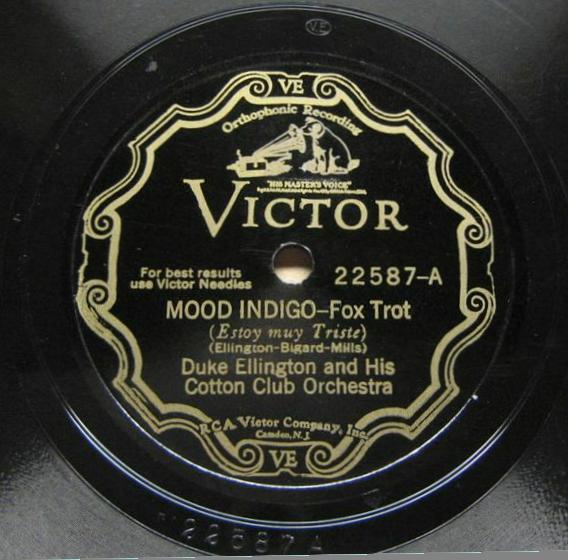“The music stopped and one of the fellows put in another nickel. A new record swung up off the turntable and a mellow baritone voice filled the little room.
“‘Crosby,’ said Marie. ‘He’s sure swell.’
“‘He sure is,’ agreed Roy. ‘He’s about the only singer I like. I hate singers. They ought to have on skirts. But not that guy. He’s got a real voice and I hear he’s right all the way.'”
W.R. Burnett, High Sierra
Archives for 2011
TT: What’s in a name
 Nobody ever really liked “Black Beauty,” the working title of my Duke Ellington biography, so I spent a day last week trying to think of a better alternative. Actually, it took about five minutes for the light to come on, after which I said to myself, “Duh, I know–why not call it Mood Indigo: A Life of Duke Ellington?”
Nobody ever really liked “Black Beauty,” the working title of my Duke Ellington biography, so I spent a day last week trying to think of a better alternative. Actually, it took about five minutes for the light to come on, after which I said to myself, “Duh, I know–why not call it Mood Indigo: A Life of Duke Ellington?”
As a rule I don’t care for obvious titles, but sometimes the obvious solution to a problem is also the best one, and no sooner did this one come to me than I got the strong feeling that I was finally on the right track. I ran Mood Indigo past my publisher and Mrs. T, both of whom gave it a very enthusiastic thumbs-up. The next day I posted the new title on Twitter and Facebook and got unanimously favorable responses. So until and unless a decisively superior idea occurs to me, Mood Indigo it is.
Now all I have to do is finish the damn book!
TT: One never knows, do one?
Courtesy of YouTube, here is the Norman Petty Trio’s 1954 recording of “Mood Indigo.” (Yes, that Norman Petty.) My father owned a copy of the original single, and I played it constantly when I was a little boy. It was the first song by Duke Ellington that I ever heard. Who knew?
TT: Almanac
“Violence is a form of stupidity.”
W.R. Burnett, The Asphalt Jungle
TT: Somewhere or other
On Friday night I returned to Manhattan, where the trees are bare, the air is crisp, and I take cabs instead of driving my own (rented) car. I’ve been elsewhere–mostly in Florida–for much of the past three months, and I hit the road mere days after moving to a new apartment in a new neighborhood. Because of all this, the sense of strangeness that I always feel on returning to New York has been heightened even further. You’d almost think I was still on the wing: I haven’t had time to hang any of the pieces in the Teachout Museum, and unopened cardboard boxes are piled high in every room.
 Fortunately, all of our books and compact discs are shelved, which makes the place feel somewhat more like home. But it isn’t, not yet, and it won’t be for some time to come, not until we open a few more boxes and buy quite a bit more furniture (we moved from a tiny one-bedroom pied-à-terre to a much larger two-bedroom apartment).
Fortunately, all of our books and compact discs are shelved, which makes the place feel somewhat more like home. But it isn’t, not yet, and it won’t be for some time to come, not until we open a few more boxes and buy quite a bit more furniture (we moved from a tiny one-bedroom pied-à-terre to a much larger two-bedroom apartment).
It doesn’t help that Mrs. T is in Los Angeles, visiting friends and family and waiting for the last traces of winter to vanish before coming back to New York, which has been far too cold for her of late. I’m more of a winter person, but I, too, have lost my taste for gray skies and dirty snow, and I found it downright painful to lock the door of our borrowed Florida condo for the last time and head for the airport.
What did help–after a fashion–was that the trip that followed was perfectly frightful. It took nine hours from portal to portal, and I spent four of them sitting in an Orlando departure lounge, growing grumpier by the minute. By the time I finally got home, I was so relieved to be there that I was more than willing to overlook the fact that I’d left the warmth of central Florida far behind me. Come Saturday there was plenty of sunshine to distract me, and by Sunday I was starting to feel as though I might possibly be able to put up with Manhattan again.
That remains to be seen…or, rather, it doesn’t. I really do live here, after all, and I’ll be back on the aisle come Tuesday night, seeing Arcadia on Broadway with a new friend. For better or worse, I’ve returned to what is, at least for the moment, my natural element. Above all, I won’t be catching any more planes until the end of April, for which I’m profoundly, even abjectly grateful. “Human life is everywhere a state in which much is to be endured, and little to be enjoyed,” Dr. Johnson assured us in Rasselas. That stoic sentence occurred to me more than once as I made my slow, bumpy, crowded, thoroughly disagreeable way north to Manhattan, the place where I work and live and where I’ve spent the past quarter-century doing my best to feel at home.
TT: Just because
John Scofield and Medeski, Martin, & Wood play “A Go Go” live in 2007:
TT: Almanac
“Rico had no ear for music; he couldn’t even whistle, or distinguish one tune from another. But he liked rhythm. There was something straightforward and primitive about jazz rhythms that impressed him.”
W.R. Burnett, Little Caesar
CD
Percy Grainger, The Complete 78-RPM Solo Recordings 1908-1945 (Appian, five CDs). The composer of “Country Gardens” and “Molly on the Shore” was also one of the greatest pianists of the twentieth century, a marvelously idiosyncratic virtuoso whose style ranged from tender lyricism to explosive extroversion. Most of his 78s have been unavailable in any format since their original release. This much-needed box set solves that problem–and does it right. Ward Marston’s digital transfers of such classic Grainger recordings as Chopin’s B Minor Sonata, Schumann’s Symphonic Etudes, and Grieg’s “Wedding Day at Troldhaugen” are crystal-clear and scratch-free. The liner notes are by Grainger biographer John Bird. I doubt there’ll be a more important classical reissue in 2011 (TT).
